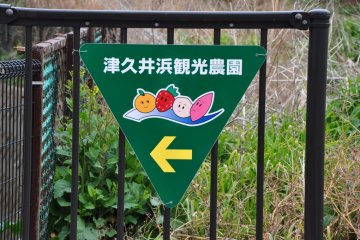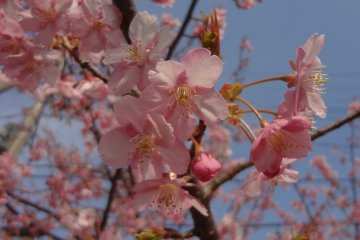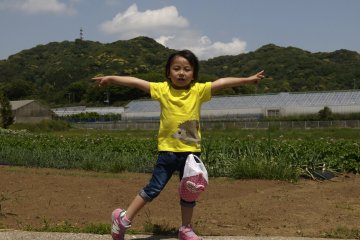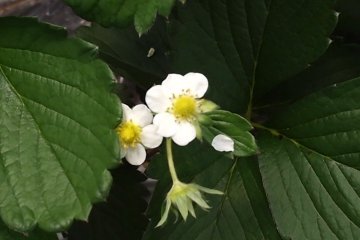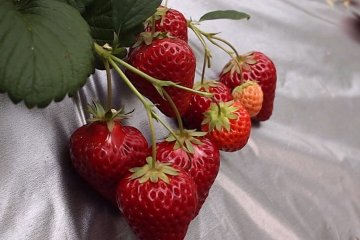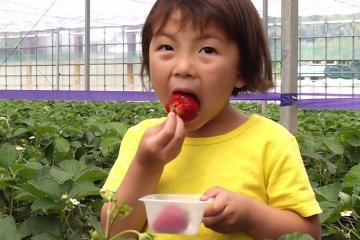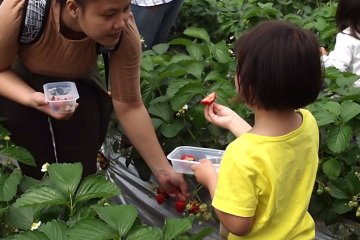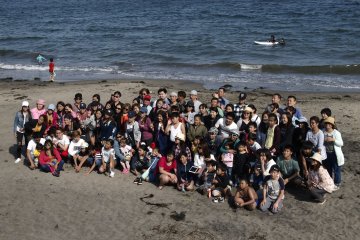How many strawberries could you consume in thirty minutes? If you were given half an hour to eat-all-you-can at a strawberry farm in Tsukui, Yokosuka City, how much do you think you could manage to finish?
The other day, I joined a group of Japanese and Filipinos families on a strawberry-picking (ichigo-gari) outing at Tsukui-hama Kankō Nōen (Tsukuihama Travellers’ Farm). From Yokohama Station, we boarded the express Keikyu Line bound for Misakiguchi. It took about 45 minutes to arrive at Tsukuihama Station. A shuttle bus was waiting in front of the station; it had several trips taking pickers to the farm and back. The ten-minute ride (about 25 minutes on foot) took us to a strawberry farm in the heart of a lush valley.
I have tried grape-picking (budo-gari) in Yamanashi and pear-picking (nashi-gari) but I have never done strawberry-picking before. Therefore, I was a little excited.
Natural-grown strawberries are rare these days. Commercial fruit grown under the sun and the blue sky are quickly disappearing. Thus, when we arrived at the farm, I was not surprised to see a row of 'green houses' or ‘vinyl houses.’ Farming these days has been taken indoors.
We were directed to go to Farm #16 and 'Houses No. 2 and No. 3.’ The system was: eat-all-you-can in thirty minutes; eat all the ripe ones; move forward; never go backwards; don't throw away any left-overs; once you leave the 'house' you're not allowed to return; most importantly, eat-all-you-can but take nothing outside the 'house'. This is funny, I said. You can eat everything but you can't take anything home.
Each of us was given a little plastic tray with a dollop of condensed milk.
'What's the milk for?' I asked the elderly lady at the reception.
'It's for you to dip the fruit in,' she explained.
'Really?' I said very much surprised.
In the Philippines, I thought, when you eat something sour like green mangoes, what you would need is some salt; not condensed milk. But in Japan, when something is sour, you need to make it sweeter. Since it was my first time to join such an activity, I was amazed to see a number of participants asking for more dollops of milk; and later, I found out, a few had brought their own tubes of condensed milk; they were devouring the red succulent and already sweet fruit, dipped and sometimes, soaked in sweetened milk.
Going fruit-picking, I thought, was mainly for children. But watching my fellow adults getting excited and overjoyed, made me realize the joy of harvesting fruit transcends age and social status. In fact, some adults were more eager than the kids.
In half an hour, I believe I did justice to twenty red and juicy April strawberries. Sparingly, I dipped them into the sweetened milk. They tasted heavenly. Others said they had thirty; a few had over forty. An average of one piece a minute, I thought, wasn’t bad.
On the way back to the station, I joined the group that opted to walk. It has always been my belief that exploring a place on foot is the most satisfying; it brings the most number of discoveries. In the heat of the early summer sun, however, most participants lined up for the shuttle bus.
Harvesting strawberries and walking, I thought, was a good combination. I passed by fields of kabocha (pumpkins), rape blossoms, orange orchards, corns, and vegetable farms. Tsukui is a fertile valley blessed with the sun, the sea, and luxuriant hills.
The thirty-minute walk ended at the beach of Tsukuihama. The twenty strawberries that I had partaken, I felt, gave me the needed energy for the walk.
We lunched by the seawall where we shared each other’s foods and dishes. After lunch, we played some games; both adults and children participated. Strawberries and sand was an unexpected combination that commenced my Golden Week.




